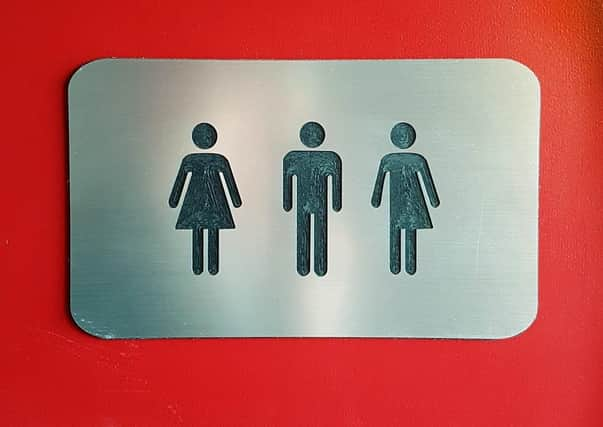Belfast court trans judgment ‘a major change to the system’


However, a prominent critic of transgender activism has said it looks like a way of introducing a contentious change in the law “through the back door” – rather than via a political route.
The case in question concluded in Belfast’s High Court on Friday.
Advertisement
Hide AdAdvertisement
Hide AdA transgender person (who was granted anonymity) had challenged the government over its requirements for obtaining a Gender Recognition Certificate.
These certificates are an official recognition of someone’s transition from male to female (or vice versa) and allow the bearer to change their sex on their birth certificate.
In order to get one, applicants do not need to have had any hormones or undergo any surgery.
However, there are a handful of criteria:
> Applicants must show they have lived in their new identity for two years;
Advertisement
Hide AdAdvertisement
Hide Ad> They must pledge that they intend to remain in their new gender permanently;
> And – crucially – they must have a diagnosis of “gender dysphoria” – something which is described in law as a “disorder”.
The NHS describes it as “a sense of unease that a person may have because of a mismatch between their biological sex and their gender identity”.
Whilst the judge ruled that the government is still able to require applicants to undergo some kind of diagnosis, it is contrary to the European Convention on Human Rights to call their condition a “disorder”.
Advertisement
Hide AdAdvertisement
Hide AdThe court challenge followed a long-running campaign by trans activists to get the government to scrap this need for a gender dysphoria diagnosis, and replace it with a system called “Self-ID”.
Self-ID basically means letting people switch from male to female, or vice versa, without any diagnosis or medical / official oversight.
After initially signalling that it supported Self-ID, last September the government dropped its plans – largely thanks to a campaign by feminists worried about men “identifying” as women in order to gain access to female showers, toilets, sports, and so on.
Reacting to the Belfast judgment, Eloise Stonborough, associate director of policy and research at Stonewall said: “The current system to changing your legal gender is out of date and demeaning.
Advertisement
Hide AdAdvertisement
Hide Ad“Trans people wishing to change their legal gender must prove, among other criteria, that they suffer from a medical ‘disorder’.
“It is fantastic that the High Court has ruled that this requirement is an ‘unnecessary affront to the dignity of the person applying’.
“Equality for all trans and non-binary people is long overdue, and we hope that this landmark ruling will be a wake-up call to introduce a system that treats trans people with the respect they deserve.”
‘WHAT IS WRONG WITH HAVING A DISORDER?’
Dr Debbie Hayton, meanwhile, is a prominent critic of many of the claims of trangender activists, and routinely writes columns about such matters (her day job is as a schoolteacher and trade unionist in England).
Advertisement
Hide AdAdvertisement
Hide AdShe was originally a man, but underwent hormone treatment and surgery and now lives as a woman (though she has also written about the fact she cannot change her genetic make-up).
She never felt the need to get a certificate herself, stating that they are usually used for retroactively changing one’s birth certificate, and that she has never wanted to do that.
She said that for her the Belfast court judgment “raises major concerns”.
“Fundamentally, it seems like the courts doing the job of government,” she said.
“It’s the job of government to make laws, not the courts.
Advertisement
Hide AdAdvertisement
Hide Ad“This court judgment here significantly changes the basis on which gender recognition occurs.
“Gender recognition was brought in to help people with a recognised medical condition live their lives in society. That’s what it’s there for.
“Now, we call these medical conditions disorders.
“What’s wrong with having a disorder? Short-sightedness is a disorder!
“All it means is that it is away from the norm, it’s a variation – that’s all.
Advertisement
Hide AdAdvertisement
Hide Ad“I’ve lots of ‘disorders’ – that’s what makes me Debbie Hayton and not someone else.
“It seems to me it takes away the need for a meaningful diagnosis of something and introduces Self-ID by the back door.”
Read more from this reporter:
Click here: Director of transgender group hired to train PSNI dubbed police ‘racist oppressor pigs who deserve the wall’
Advertisement
Hide AdAdvertisement
Hide AdClick here: Use transgender pronouns or face possible dismissal: new guidelines for NI’s 23,000 civil servants
——— ———
A message from the Editor:
Thank you for reading this story on our website. While I have your attention, I also have an important request to make of you.
With the coronavirus lockdown having a major impact on many of our advertisers — and consequently the revenue we receive — we are more reliant than ever on you taking out a digital subscription.
Subscribe to newsletter.co.uk and enjoy unlimited access to the best Northern Ireland and UK news and information online and on our app. With a digital subscription, you can read more than 5 articles, see fewer ads, enjoy faster load times, and get access to exclusive newsletters and content. Visit https://www.newsletter.co.uk/subscriptions now to sign up.
Advertisement
Hide AdAdvertisement
Hide AdOur journalism costs money and we rely on advertising, print and digital revenues to help to support them. By supporting us, we are able to support you in providing trusted, fact-checked content for this website.
Alistair Bushe
Editor